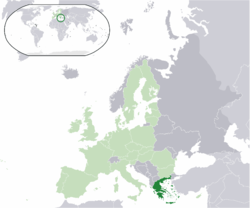Greek Crisis Closing Stores, Ending Dreams
By SETimes
By Andy Dabilis
In September, Christina Aggelaki, 56, will close the sporting goods store she and her husband have operated in a western Athens neighbourhood for 30 years, victims of a deep recession worsened by austerity measures that has slowed spending to nearly a standstill.
“It’s been an ever-increasing downfall and this crisis was the final blow,” she told SETimes as she sat in her store with a friend, Aliki Tanaki, 44, who closed two wedding supply stores.

All around Aggelaki, the shelves were half-empty: a few running shoes, a couple of basketballs for 10 euros, marked-down sweatsuits. She said she sometimes waits all day for one or two customers. Aggelaki said she realised last Christmas the store couldn’t make it through this year, once she sold the remaining inventory.
Greeks have had their pay cut 30 percent or more and their summer and holiday and bonuses slashed as much as 80 percent, leaving them with little disposable income during a five-year recession that is getting worse by the day.
“I feel desperate,” Aggelaki said. Tanaki nodded her head in agreement. “You can’t dream anymore,” she told SETimes.
They have plenty of company. Only five months ago, the National Confederation of Greek Commerce (ESEE) said the commercial sector was in a “closure epidemic,” and that by the end of the year Greece will have lost at least 68,000 businesses since January 2011.
Even the most-trafficked areas around the city centre are feeling the crunch. Streets are lined with empty stores, grimy windows barely hiding loose papers and forgotten inventory.
On Stadiou Street, a major thoroughfare leading to the city’s centre, 42 percent of the stores are gone. ESEE said Athens has lost 30 percent of its stores overall as successive governments have imposed waves of pay cuts, tax hikes and slashed pensions in a desperate attempt to halt a slide toward bankruptcy that doesn’t seem to be working.
Valia Aranitou, director of the Labour Institute at ESEE, said many more stores will close because of the crisis and tax hikes they could not afford with dwindling sales.
“This is the worst because until now many shopkeepers had some money on the side so they could pay the taxes, but now those monies are ending,” she told SETimes.
The organisation expects sales to drop 53 percent this year, an indicator of what its president, Vassilis Korkidis, wrote in a position paper. “The market is dried up, entrepreneurs watch their turnovers collapse, and the consumers go back to purchasing only goods that cover primary needs.”
Surveys have shown Greeks switching to generic brands and cutting back on luxury items, such as jewelry, but even on food, shoes and grooming.
Notos Galleries, a giant department store chain, said it had a 15 percent drop during the Easter period when Greeks were paid smaller bonuses, wiping out the profit projections for the year.
August is one of the two official sales periods in Greece, but even with prices marked down as much as 80 percent, there are few takers in many stores.
Maritha Kalli, 36, a graphics designer, was staring in a shoe store window, but said she wasn’t ready to buy because even with a 35 percent pay cut, her business is struggling to meet the payroll.
“We get paid only half the time now,” she told SETimes. She said the businesses’ owners tell her it’s not their fault. “Companies who owe us money don’t pay for three months,” she said.
While salary cuts have been mandated for public sector workers, the private sector, following a slashing of the minimum wage and phasing out of collective bargaining rights for workers, has quickly followed suit. And with a 23.1 percent unemployment rate — 54.9 percent for those under 25 — most workers have to accept what they get, or get nothing. And they don’t spend.
With a new coalition government mulling more pay and pension cuts and eliminating bonuses completely, there seems little hope businesses, or jobs, will come back.
On Ermou Street, the busiest in the city, there was a lot of window-shopping, including by Kalli, who walked away without buying anything. She said she’s cutting back on even the most basic essentials. “I even buy cheaper toilet paper,” she said with a smile.
